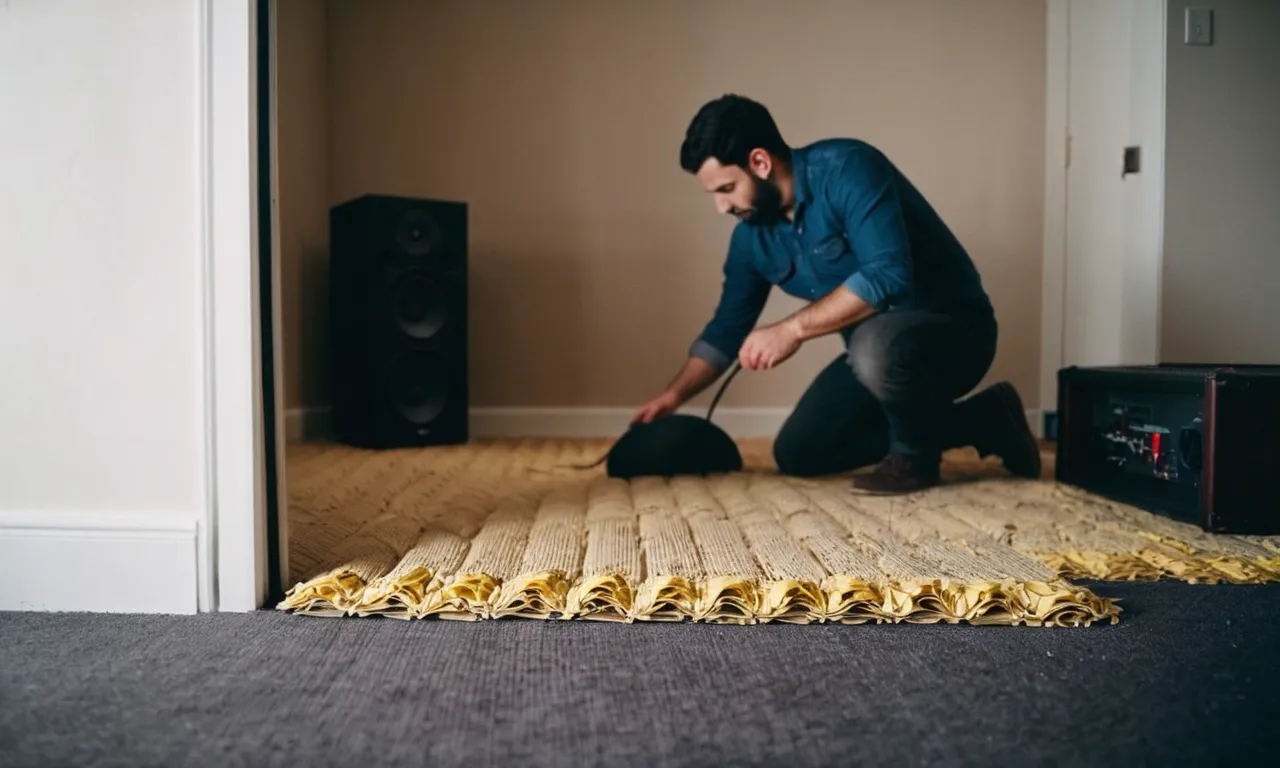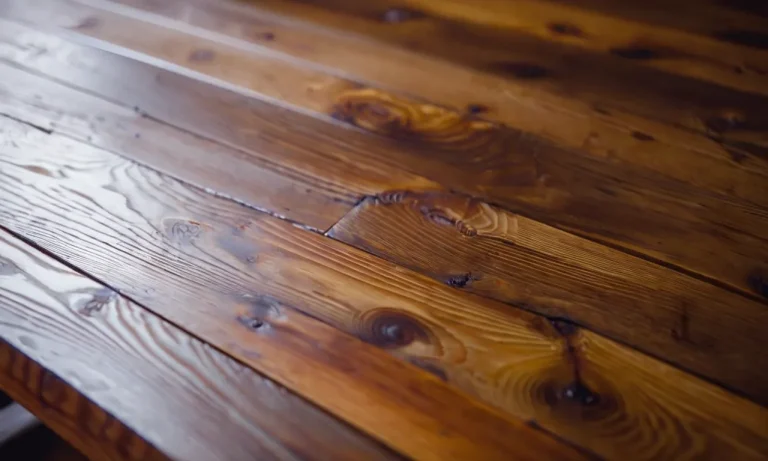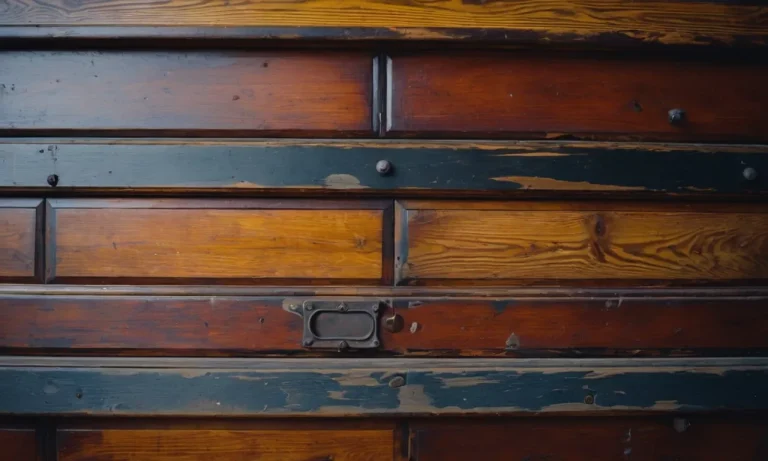How To Soundproof Your Apartment Floor
If you live in an upstairs apartment, you may be self-conscious about neighbors below hearing your every footstep. Conversely, if you live downstairs, footsteps from above can be frustratingly loud and disruptive.
Luckily, there are affordable ways to soundproof floors in apartments to reduce noise transfer between units.
If you’re short on time, here’s a quick answer to your question: Install mass loaded vinyl, double up on carpet padding, use rugs, and add acoustic underlayment beneath laminate flooring to dampen footsteps and other impact noises coming through the floor.
Understand What Causes Noise Transfer Through Floors
Living in an apartment can be a great experience, but it can also come with its fair share of noise problems. One of the most common sources of noise disturbance is the transfer of sound through the floors.
Understanding what causes this noise transfer is the first step towards effectively soundproofing your apartment floor.
Impact Noises from Walking, Jumping, Dropped Objects
One of the main culprits of noise transfer through floors is impact noises. These sounds are created when someone walks heavily, jumps, or drops objects on the floor. Impact noises can easily travel through the structure of the building and disturb the peace in your apartment.
They can be particularly annoying if you live in an apartment building with thin floors or if your neighbor has a tendency to be heavy-footed.
To minimize impact noises, there are several steps you can take. One effective solution is to install carpet or rugs in your apartment. These soft materials can absorb and dampen the impact sounds, reducing their transmission through the floor.
Additionally, you can consider using soundproof underlayment, which is specifically designed to reduce impact noises. It acts as a barrier between the flooring and the subfloor, preventing sound vibrations from traveling through.
Airborne Noises Like Conversation, TV, Music
Another common type of noise that can transfer through apartment floors is airborne noise. These are sounds that travel through the air and can include conversations, TV noise, music, and even the sound of footsteps.
Airborne noises can be particularly disruptive as they can travel easily from one apartment to another.
To address airborne noises, there are different methods you can employ. One option is to use acoustic panels or soundproof curtains to absorb and block the sound waves. These products are designed to reduce echo and reverberation, making your apartment quieter.
Another effective solution is to seal any gaps or cracks in the floor or walls, as these can act as pathways for sound to travel through. Additionally, you can consider using soundproofing materials such as mass-loaded vinyl or soundproof underlayment, which can help to reduce the transmission of airborne noises.
Remember, every apartment is unique, and the effectiveness of these solutions may vary depending on the construction and layout of your building. It’s always a good idea to consult with a professional or explore credible websites such as www.soundproofcow.com for more specific advice and guidance tailored to your situation.
Choose the Right Soundproofing Materials
When it comes to soundproofing your apartment floor, choosing the right materials is crucial. Here are some options that can help you minimize noise transmission and create a quieter living space:
Mass Loaded Vinyl
Mass Loaded Vinyl (MLV) is a popular choice for soundproofing floors. It is a dense and flexible material that can effectively block out unwanted noise. MLV can be installed under your flooring or laid on top of it.
Its high mass helps to absorb and reduce vibrations, preventing sound from traveling through the floor.
Thick Carpet Padding
Adding a layer of thick carpet padding underneath your carpet or rugs can help to absorb sound and reduce impact noise. The padding acts as a cushion, minimizing vibrations and preventing sound from echoing throughout your apartment.
Rugs
Strategically placing rugs in high-traffic areas can also help to dampen noise. Rugs act as an additional barrier between your floor and the rest of the apartment, absorbing sound and reducing footstep noise. Opt for thick and dense rugs for better sound insulation.
Acoustic Underlayment for Laminate Floors
If you have laminate flooring in your apartment, using an acoustic underlayment can significantly reduce noise transmission. Acoustic underlayment is specifically designed to minimize impact noise and improve sound insulation.
It is usually made of materials like cork or rubber, which have excellent sound-absorbing properties.
Remember, the effectiveness of these soundproofing materials may vary depending on the construction of your apartment building and the type of noise you are trying to block. It is always a good idea to consult with a professional or do thorough research before making a decision.
Install Soundproofing Floor Underlayments
If you’re looking to soundproof your apartment floor, one effective method is to install soundproofing floor underlayments. These underlayments are specifically designed to reduce noise transmission by absorbing and blocking sound vibrations.
They can make a significant difference in reducing impact noise, such as footsteps or dropped objects, as well as airborne noise, such as voices or music.
DIY Installation Tips
If you’re a handy person and enjoy DIY projects, you can easily install soundproofing floor underlayments yourself. Here are some tips to help you with the installation process:
- Choose the right underlayment: There are various types of underlayments available in the market, such as rubber, cork, or foam. Each has its own unique properties, so it’s important to choose one that suits your specific needs and budget.
- Prepare the floor: Before installing the underlayment, make sure the floor is clean, dry, and free from any debris. This will ensure proper adhesion and a smooth installation.
- Measure and cut: Measure the dimensions of your room and cut the underlayment accordingly. Be sure to leave a small gap around the edges to allow for expansion.
- Install the underlayment: Lay the underlayment down on the floor, starting from one corner and working your way across the room. Use adhesive or tape to secure the underlayment in place, following the manufacturer’s instructions.
- Install the flooring: Once the underlayment is installed, you can proceed with installing your desired flooring material over it. Whether it’s hardwood, laminate, or carpet, the underlayment will provide an additional layer of soundproofing.
By following these DIY installation tips, you can effectively soundproof your apartment floor without the need for professional assistance.
Professional Installation
If you’re not confident in your DIY skills or simply prefer to leave the job to the experts, hiring a professional for the installation of soundproofing floor underlayments is a great option. Professionals have the experience and knowledge to ensure proper installation and maximize the soundproofing benefits.
When hiring a professional, make sure to choose a reputable company with positive reviews and a track record of successful installations. They will assess your specific needs and recommend the most suitable underlayment for your apartment floor.
Professional installation may involve additional costs, but the peace of mind and guaranteed results are often worth it.
Remember, soundproofing your apartment floor can bring numerous benefits, such as improved privacy, reduced noise disturbances, and a more peaceful living environment. Whether you choose to go the DIY route or hire a professional, installing soundproofing floor underlayments is a worthwhile investment.
Add Rugs for Extra Sound Absorption
Area Rugs Over Hard Floors
One effective way to soundproof your apartment floor is by adding area rugs over hard floors. Hard floors, such as hardwood or tile, can reflect sound waves and cause echoes, making the noise travel further.
By placing area rugs strategically throughout your apartment, you can help absorb and dampen the sound, reducing the noise transfer between floors.
Not only do area rugs provide sound absorption, but they also add a cozy and stylish touch to your living space. You can choose rugs that complement your existing décor and create a warm and inviting atmosphere in your apartment. It’s a win-win situation!
When selecting area rugs for soundproofing, opt for thick and dense materials like wool or shag. These materials have excellent sound-absorbing properties and can effectively reduce the impact of footsteps, furniture movement, and other noises that can disturb your neighbors below.
Wall-to-Wall Carpeting
If you’re looking for a more permanent solution to soundproof your apartment floor, consider installing wall-to-wall carpeting. This option provides the most comprehensive sound absorption as it covers the entire floor surface, minimizing noise transmission to a great extent.
Wall-to-wall carpeting is particularly beneficial in high-traffic areas like living rooms and hallways, where noise levels tend to be higher. It helps to muffle sounds and create a quieter environment for both you and your neighbors.
When choosing carpeting, select a high-quality, dense carpet with a thick underpadding. The density of the carpet fibers and the thickness of the underpadding play a crucial role in soundproofing effectiveness.
Additionally, consider opting for carpets with a higher pile height, as they provide better sound absorption compared to shorter pile carpets.
Keep in mind that installing wall-to-wall carpeting may require the approval of your landlord or building management. Make sure to check your lease agreement and consult with the necessary authorities before making any changes to your apartment floor.
For more information on soundproofing and home improvement, you can visit websites like Soundproof Cow or The Spruce. These websites offer valuable tips and advice on various soundproofing techniques and product recommendations.
Other Tips for Noise Reduction
In addition to soundproofing your apartment floor, there are several other tips you can try to further reduce noise and create a quieter living environment. Here are some additional methods you can consider:
Use Acoustic Sealant
One effective way to minimize sound transmission is by using acoustic sealant. This specialized sealant is designed to fill in gaps and cracks in walls, floors, and ceilings, preventing sound from traveling through these openings.
By applying acoustic sealant around baseboards, windows, and doors, you can significantly reduce noise leakage and make your apartment more soundproof.
Add Acoustic Panels on Ceilings
Another effective method to reduce noise is by installing acoustic panels on the ceilings. These panels are designed to absorb soundwaves, preventing them from bouncing off hard surfaces and causing echoes.
By adding acoustic panels, you can create a more acoustically balanced space and reduce the amount of noise that reaches your apartment from the floors above.
Speak to Neighbors Politely
If you are experiencing excessive noise from your neighbors, it may be worth having a polite conversation with them to address the issue. Sometimes people may not be aware of how loud they are being, and a friendly conversation can go a long way in resolving the problem.
Approach them with respect and explain the impact the noise is having on your daily life. They may be willing to make adjustments to their activities or be more mindful of noise levels.
Remember, maintaining good relationships with your neighbors is essential for a harmonious living environment. By approaching the situation politely, you increase the chances of finding a mutually beneficial solution.
For more information on soundproofing techniques and products, you can visit websites such as Soundproof Cow or Acoustimac. These websites provide a wealth of knowledge and offer a wide range of soundproofing solutions that can help you create a quieter and more peaceful living space.
Conclusion
With the right combination of underlayments and rugs, you can successfully reduce noise transferring between apartment floors. This will make your home more peaceful and prevent disturbances to neighbors. Just be sure to get any necessary approvals before installing soundproofing materials.
A small investment in floor soundproofing can make a big difference in quality of life when living in close apartment quarters.







